Hatem Elatawy, Deputy Director of Cairo Center for Conflict Resolution and Peacekeeping in Africa (CCCPA) appreciates Japan`s continued contributions to building institutional and human capacity is most desirable for African countries.
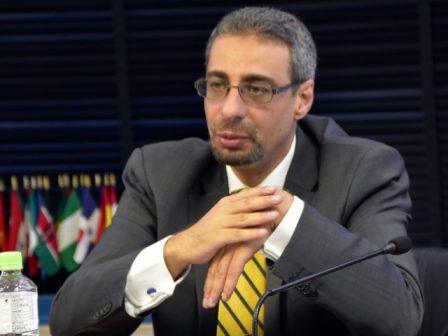
Prof. Ai Kihara-Hunt, Secretary-General of the Global Peacebuilding Association of Japan, opened the consultation meeting, introduced the speakers of opening remarks, and Ms. Yumiko Kaneko of Nottingham University introduced the guest speaker.
Mr. Masaki Noke, Director-General, International Peace Cooperation Headquarters, Cabinet Office, Government of Japan.
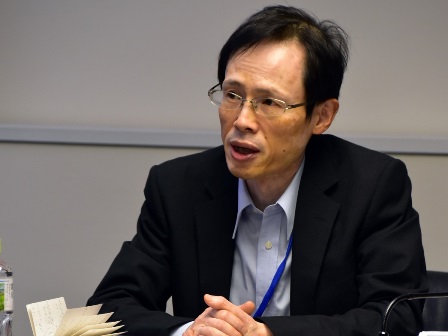
Mr. Noke touched upon three elements to consider in relation to Japan’s assistance to peacekeeping in Africa. First, there are evolutionary changes taking place in PKOs. Currently, out of the fifteen PKO missions, eight are in Africa. The number of peacekeepers doubled from 2004 to 2016. The budget of UN PKO missions increased around threefold. The UN PKO missions have become complex with diverse mandates. To cope with higher threats both to missions and to civilians, regional organizations’ involvement, especially of the African Union, has increased.
The second point is the development of Japan’s own experience and capabilities in the area of peacekeeping. In addition to being the third largest financial contributor to UN PKOs, Japan has also sent contingents to missions in the field. This year marks the 25th anniversary of the enactment of Japan’s International Peace Cooperation Law and its first deployment to peacekeeping missions in Angola and Cambodia. In Africa, we have worked in Angola, Mozambique, Democratic Republic of the Congo, Sudan, and South Sudan. Japan has demonstrated its unique advantages such as advanced technology, especially in the area of engineering, and has also been keeping the highest standard of discipline with zero sexual abuse. In 2015, the International Peace Corporation Law was revised in response to diversifying operational needs and activities. With new opportunities in mind, Japan will continue to explore further possibilities of contributions.
Third, Japan’s commitment to Africa is not limited to dispatching contingents. Since 2008, Japan has worked to assist PKO centers in Africa, including the Cairo Center for Conflict Resolution and Peacekeeping/Peacebuilding in Africa (CCCPA) in Egypt, contributing in total 46 million US dollars. It is also important to note that since 2015, Japan has been offering training for personnel from Africa, in the Triangular Partnership Project for African Rapid Deployment of Engineering Capabilities (ARDEC), for operation and maintenance of heavy equipment. In the current PKO missions in Africa, while more than half of the personnel are from African countries, Asian countries offer about 30 percent of the personnel. In this sense, cooperation between Africa and Asia is becoming more necessary than before, and assistance for such kind of Asia-Africa cooperation should be enhanced.
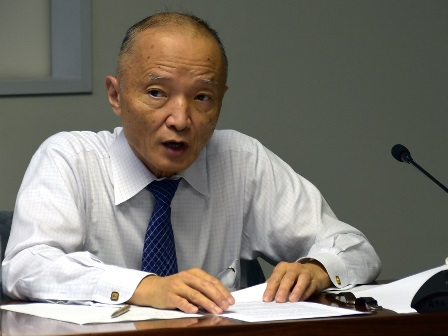
Former Japanese Ambassador to Egypt, Mr. Kaoru Ishikawa spoke about why Japan has started to support the CCCPA a decade ago in his personal capacity. Many thought the 20st century was the century of bloodshed and the 21st century would be a century of wisdom. But the reality was the opposite.
After the Cold War, European states lost colonial interests in Africa. It invested resources in Central and Eastern Europe instead. That is understandable in light of their strategic concerns. That gave golden opportunity to African people to decide their own fate. Japan has started TICAD process with the slogan: no more charity. Vertical approach to Africa is wrong, and horizontal approach must be taken with respect. On African side, notion of ‘African renaissance’ was born.
This golden opportunity however was undermined by armed conflicts in Africa.Under those circumstances, CCCPA was being reborn and the UN and Japan immediately responded to their request for support, both financially and in training. Why? Because we cannot establish peace unless there is involvement of local people. Imposed ceasefire does not last, because the former protagonists keep their ambition to overrun their former enemy. That is why peace building should be multilayered, involving not only military but also police, civil service, NPOs and civil society. Women‘s participation is important as well. On the trainer’s side, there should also be military, police, civilians and academia, and women.
In conclusion, imposed peace does not last. Peacebuilding would be more solid if local people are involved from various fields and multilayered. That supporters’ side should not have political and geo-political ambition. Never getting to vertical relations, horizontal relations should be kept with solidarity between those who are supporting and who are supported.
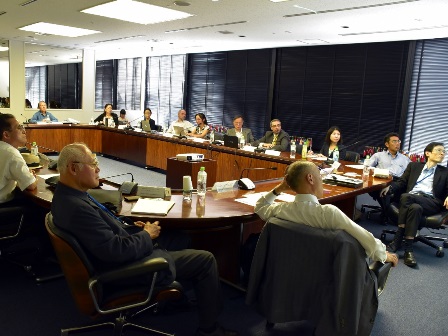
Mr. Hatem Elatawy, Deputy Director, Cairo International Center for Conflict Resolution, Peacekeeping and Peacebuilding (CCCPA) introduced the CCCPA. The CCCPA was established by the Egyptian Ministry of Foreign Affairs in 1994, and it has since then became an African Union Center of Excellence for providing training, education and capacity building. It is the only Arab civilian training center in the field of peace and security. In 2017, the Center was rechartered to officially expand its mandate geographically to cover the entire world rather than just Africa, as well as thematically to work on the full range of peace and security issues. He explained that there are mainly five thematic areas of the Center’s work: peacekeeping, peacemaking/peacebuilding, preventing radicalization and extremism, leading to terrorism, transnational threats (including combating human trafficking and smuggling of migrants), and gender mainstreaming. The Center is being advised by an International Advisory Board currently chaired by H.E. Amre Moussa (Egypt) and has Prof. Hasegawa in its membership. In addition to Japan, the Center has among its partners the UN (including several departments, organs and programmes including UNDPKO, UNDP and UN Women), the African Union and the League of Arab States (including the Arab Women Organization). CCCPA is hosting the annual IAPTC conference this year, and is also a member of the Board of Directors of the African Peace Support Training Centers Association. Since 2014, the Center has grown considerably, and since then it has provided training for 10,497 persons from 79 countries.
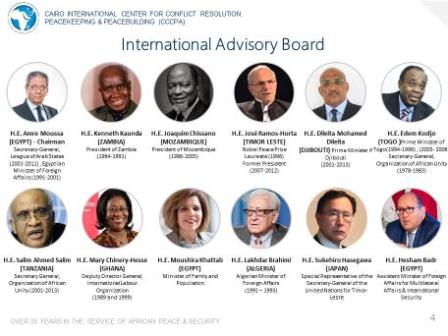
When talking about the cooperation between Japan and Africa in peacekeeping, we need to first consider the nature of conflict in Africa. At the turn of the 21st Century, there were high hopes of the ascendance of peace, but it turned out that the conflict has continued albeit with a changed nature. In the 20th Century, conflicts were between states, but now they are fought intra-states. The chart of the number of conflicts and fatalities is indicative of the brutality of the conflict. Most important part is the loss of civilians, partly caused by the nature of conflicts, with most of the victims now are civilians. Women are particularly afflicted by conflicts having witnessed sexual violence becoming a weapon of wars. Thus, eight out of the fifteen current peacekeeping missions are in Africa. Some of those peacekeeping operations are the most dangerous ones with high casualties for peacekeepers (Mali being one of the most dangerous). Moreover, international and regional interventions while providing a window – usually limited in nature – to stabilize conflicts have not yet been able to address the underlying causes of conflicts and thus often ending with relapse.
The situation in Africa has also been complicated by the presence of reckless spoilers. Criminal activities have taken an advantage of the spread of conflict and instability to cement there presence. Terrorism has been particularly afflicting Africa. For example, Boko Haram is the single most dangerous terrorist organization in Africa with the highest number of civilian causalities. This is further exacerbated by the stretches of uncontrolled borders in Africa exploited by networks of organized crimes and illegal activities which combine all sorts of illicit flow across Africa ( human trafficking, weapons, narcotic drugs and so on). This led to criminal and terrorist activities to overstep borders and rear its ugly head allover (for example Nigerian jihadists appearing and operating in Libya).
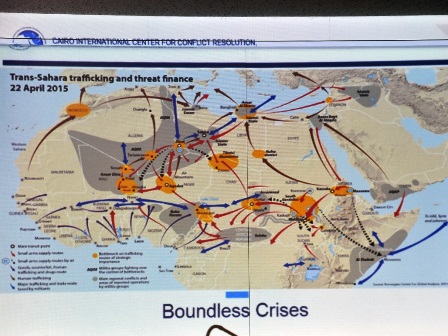
Among the other challenges facing Africa is the combined phenomenon of people movement across the borders (often as refugees and/or migrants) and population growth. Globally, as of 2015 there was a huge refugee crisis with 64 million displaced people ; the biggest wave of mass movement of people since the end of World War II, with Africa being in the Center of such movement. Such movement of people is posing economic and security problems in the countries of origin and destination. In addition, with legal routes under strict scrutiny and becoming difficult to use, illegal routes are used instead giving rise to the combined phenomenon of smuggling of migrants and (often) human trafficking. Africa’s population is growing and is overtaking Asia.
All such challenges are coming at a time where there is an external fatigue and disengagement from African crisis. While this is not a new phenomenon, as the end of the Cold War saw a similar disengagement, previously there was a brief return of interest, thanks partly to TICAD. Now there is the second wave of fatigue in the midst of financial tightening and political refocus on domestic issues. So for Africans, there is no other way but to take the matters in their own hands. There is a need for African solutions for African problems with international support. In this context, the African Union developed – with international support – the African Peace and Security Architecture.
If we move back to peacekeeping, we find a division of labour of sorts: there are countries that supply peacekeeping troops to operations while others contribute financially. Both have important role is to play.
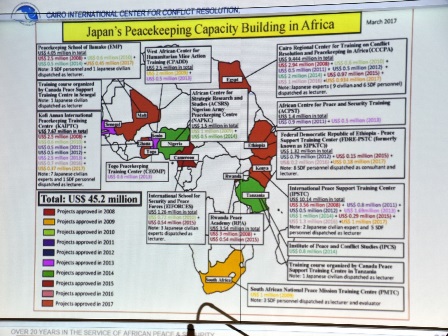
During the last 25 years, Japan has been contributing to both budget and personnel to varying degrees. Despite this long history of contribution, Japan has reached a decision to withdraw its troops from the last deployment in South Sudan. This should not diminish the important contribution that Japan can provide in the future, building on its past experience and comparative advantage. In addition to the financial contribution, Japan’s contribution to training centers is highly appreciated. In this context, about 9000 peacekeepers were deployed after receiving trainings provided by the CCCPA with financial contribution from Japan. Japan has also contributed to the establishment of the rapid deployment engineering capability training facilities in Nairobi. This is equally important given the role engineers play not only in peacekeeping activities but also for post conflict relief in host countries. In that connection, Japan’s contribution is making impact.
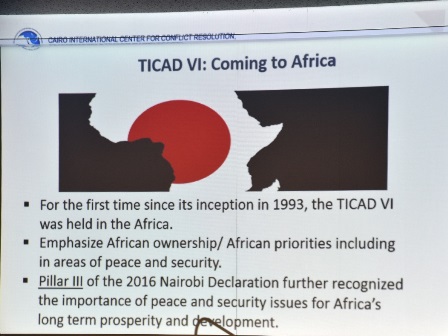
In addition to those, TICAD is making a good impact. Peace and security are essential parts. TICAD, by coming to Africa, contributes a lot to peace and security with the local ownership and international support. Its pillar III on promoting social stability corresponds well to African own APSA roadmap 2016 – 2020. That shows that TICAD process is reflecting African own priorities. However, to ensure the best synergy between the TICAD and the AU’s APSA Roadmap 2016-2020,
CCCPA has carried out activities (so far two workshops in Cairo and Addis Ababa) to harmonize such efforts. The workshops demonstrated that while there is a strong appreciation to Japan’s contributions to peace and security in Africa, there is a need to focus on prevention and not only on peacekeeping. Using peacekeeping alone is not sufficient, and does not solve the situation. Peacebuilding and prevention of the relapse of conflicts are necessary.
Prof. Sukehiro Hasegawa, President of the Global Peacebuilding Association of Japan, thanked Mr. Hatem Elatawy for his comprehensive presentation of peace and security situation in African and asked the participants to briefly introduce themselves. He then suggested that the discussion take place first a question and answer session and then a session on what Japan can do more in support of peacekeeping and peacebuilding.
Prof. Yoshitaka Hanada, former Ambassador of Japan to Timor-Leste, pointed out that the conflict has changed in its nature since the end of the Cold War and that this poses challenges. That is specially the case on impartiality, and neutrality is also affected. These principles are very important but have transformed. Recent conflicts involve civilians, and that poses danger to civilians. If civilians take refuge in a peacekeeping base, peacekeepers have no choice but to protect the civilians, but they take a risk of being seen as taking sides. However, humanitarian needs prevails, so, it is probably the case that there is no choice but to protect civilians. Peacekeepers always face this difficult dilemma.
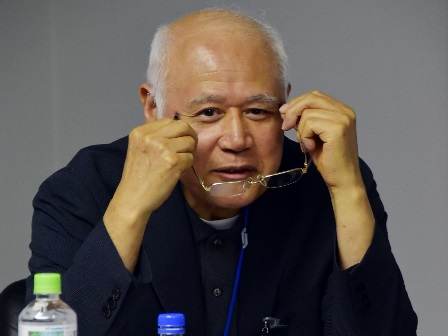
Prof. Tadanori Inomata, Strategic Advisor at Nagasaki University, posed a question whether major powers at the UN have learned from their experiences, and not be completely driven by the balance of power. The UN is not used to combat situations and deterrence. If peace is created, it is necessary to construct the basis for peace.
Ambassador Ishikawa pointed the fact that none of the firearms used in armed conflicts in Africa is made in Africa. We should raise voice against the former USSR countries and China that sell those weapons.
Mr. Elatawy replied that while firearms are a major problem in African conflicts, especially in the wake of the aftermath of the Libyan crisis and the widespread proliferation of small arms and light weapons, however parties to the conflict will manage to get lethal weapons what its nature is (for example machetes were used in Rwanda). He emphasized, therefore, on the necessity to deal with the political aspects of conflicts and the need to reach a political solution/resolution. In this context, he pointed out to the UN review processes that took place in 2015 (the High Level Independent Panel on Peace Operations and the Peacebuilding Architecture review) which emphasized what they called the “Primacy of Politics”, i.e. the importance of including political engagement of the parties to the conflict. He also emphasized the importance of “prevention” (through tools like the AU Early Warning Mechanism and the Panel of the Wise … etc) as opposed to waiting until conflict erupts and deploy peacekeepers that often only freezes conflict. As for the illicit flow of small arms and light weapons, Mr. Elatawy pointed out that it is one of the areas that CCCPA work on to raise the capacities of African officials to combat such flow.
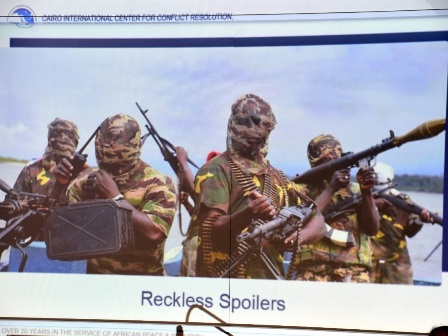
On protection of civilians mandates and what seems to be the reluctance of some Troop Contributing Countries (TCC) to implement them, Mr. Elatawy pointed out to the problem of drafting the mandates of UN Peacekeeping Missions. Not only that there has been a tendency to push forward so-called ‘Christmas tree mandate’ (which is including a large number of mandates, some unrealistic without the needed numbers and equipments, for peacekeeping missions), the usual absence of TCCs in the mandating process (drafting the initial mandates, changing the mandates, exiting strategies) is problematic. He emphasized the need to involve TCCs in these processes.
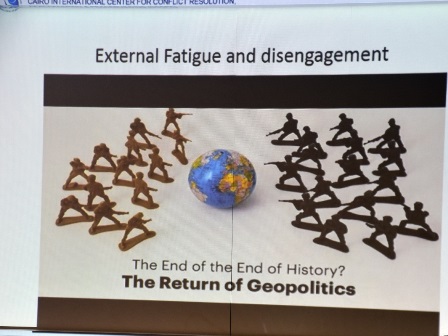
Prof. Hasegawa asked, before the US Ambassador Samantha Power finished her mandate, what the Egyptian position was on the proposed Security Council resolution that would have imposed an arms embargo and targeted sanctions on South Sudan and prohibited weapons supplies into South Sudan. Mr. Elatawy stated that while sanctions may be a useful tool in some cases, the important objective should always be to create a conducive environment for political solution, and that is the litmus test that Egypt always utilizes in deciding on what position to take. Prof. Hasegawa supported Japanese government because that resolution would cut off the flow of weapons only to one side and the balance of power would be changed. The resolution was not adopted as only 7 voted for it while 8 abstained, and the US needed one more vote and Samantha Power was very upset.
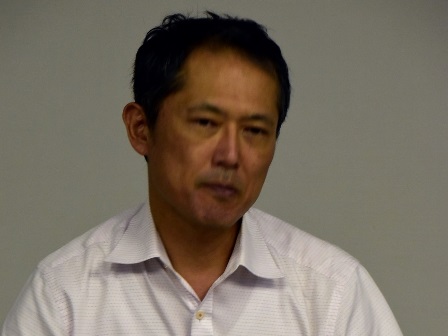
Prof. Takaaki Mizuno of Kanda University of International Relations asked about the Catch 22 situation. In relation to Japan, European countries were reluctant to send security personnel. Mandates are expanding and more challenging. He asked how much capacity the AU has to make hybrid missions.
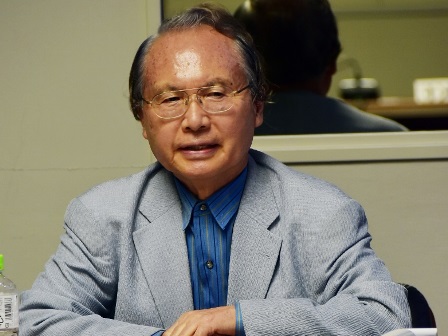
Prof. Sumihiro Kuyama, Director of the UN Association of Japan, stated on the concept of peacebuilding (PB) that, in proposing PB in his report An Agenda for Peace (1992), Secretary-General Boutros-Ghali meant post-conflict PB, which was endorsed by 2005 World Summit. However, in view of a growing recognition of the importance of the preventive aspect, situation started to change slowly, and with the adoption, in 2016, of “sustaining peace” resolutions by the Security Council and the General Assembly, the term PB is now understood as the concept emphasizing increasingly preventive side. Thus the idea of ‘preventive’ PB addressing root causes of conflict has come to be recognized as important, signifying, at the same time, the link between preventive PB and sustaining peace. In this context, it is considered that Japanese government, through the TICAD mechanism, has been contributing properly to the problems in Africa. He asked for Mr. Elatawy’s views on these matters.
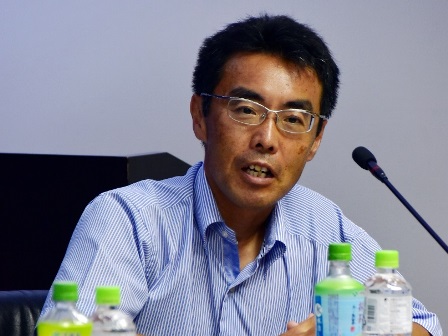
Prof. Katsumi Ishizuka of Kyoei University asked on the division of labour. Developing countries send personnel, and developed countries send money. In his opinion, many African missions are not successful because of the size of African countries. Timor-Leste was successful because it is small. For African peacekeeping, technology is needed. For this, European countries’ contributions are necessary. Also in training, European countries are important. What is the view on the strength and weakness of the EU?
Mr. Elatawy replied that African countries have a long history of contribution to peacekeeping and their efforts should not be dismissed. He also pointed out to the different types of operations whether “traditional” peacekeeping operations that occur after hostilities have ended, and the more “complex peacekeeping operations” of today and peace-enforcement operations. He also pointed out that the use of technology, especially is intelligence gathering, is a new phenomenon and still controversial.
Mr. Elatawy also pointed out that it is important to follow the debate in the UN regarding what is called the continuum of peace rather than falling into a linear consideration of the different tools (peacekeeping then peacebuilding and/or post-conflict reconstruction). He stressed that peace efforts should not be a snapshot but rather it is necessary to use all applicable tools all the time. Part of peacebuilding should be on prevention and part on peacekeeping. African mechanisms involve early warning, relying heavily on mediation.
In the AU, most operations are peace enforcement. It is to stop fighting and stabilize the situation as is the case for example in Somalia. There are also hybrid operations with the UN as in Darfur.
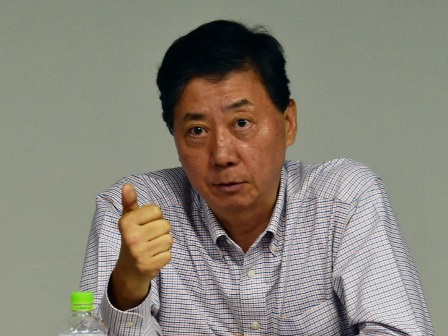
Mr. Ken Inoue, Senior Advisor to Japan International Cooperation of Japan (JICA), asked on protection of civilians (POC), in particular on Japan’s role. It is clear that it is difficult for Japanese Self Defense Force (SDF). Japanese people believe that i) peacekeepers should not be killed, and ii) they should not to kill. What is the difference between the mentality of military and civilian personnel? Is it possible for Japanese SDF to join POC missions? He also asked about the relationship between the nature of state borders and the mode of peacekeeping. In Sahara, there is no boundary. In such a place, boundary should not limit the operation. Otherwise peacekeeping cannot be effective.
Mr. Elatawy responded that there have been successful missions. Sierra Leone and Liberia are good examples. There have been approaches to area-wide interventions: Lord’s Army (global African mandate, region-wide) and G5 (anti-terrorist operation in Chad Lake region). However, state sovereignty is secure. Consent is still a prerequisite. Peacekeeping should not be supra-national, and it should only support national governments. POC remains the primary responsibility of host governments. However, this does not preclude the deployment of peacekeeping operations of Japanese personnel with the parameters described in the question (for example UNIFIL).
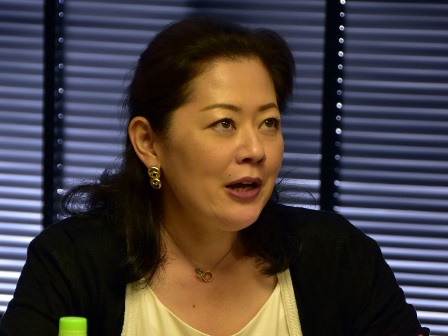
Ms. Mio Sato, IOM Representative in Japan, asked on the CCCPA’s activities related to counter-terrorism and anti-smuggling. Smuggling is civilian in its nature, and how is the CCCPA cooperating with military?
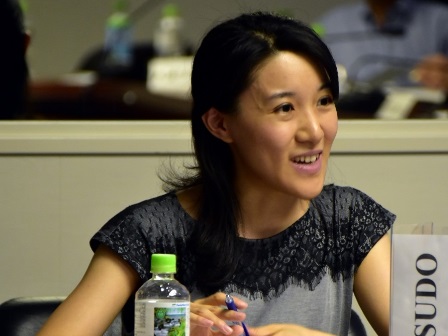
Ms. Ayano Matsudo of JICA asked on the operational capability of the G5. She doubts the operationability of the G5 and asked the speaker about the CCCPA’s contribution to address the situation in Sahara.
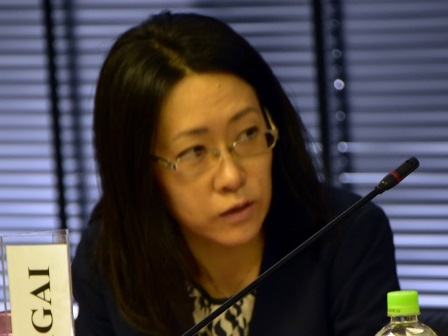
Prof. Naoko Kumagai of International University asked about the capability of the AU to strengthen the role of the AU and the UN, as the AU has a particular role on conflict resolution with the involvement of elders. She also asked whether the patterns of sexual violence in Africa are severe, which unfortunately leads to the radical interpretation of Islam. Does the CCCPA have any discussion or campaign to advocate against it?
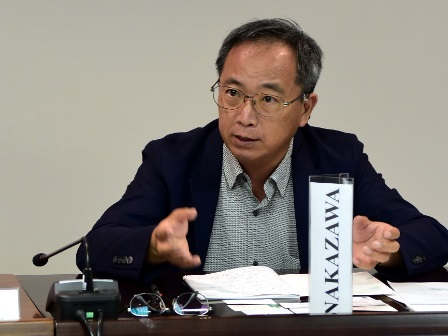
Mr. Kenji Nakazawa, Representative of International Organizations Club of the Tokyo University Alumni Association, asked about the reason of a sharp increase of the number of refugees over the last two decades. The number presented is shocking. Why is there this trend? He also asked about marking regional boundaries for the CCCPA’s operations, citing his experience with the European Bank for Reconstruction and Development (the EBRD), which started its operations in several African countries after the Arab Spring. What is CCCPA’s view on the link between peacekeeping/peacebuilding issues and new development priorities?
While reiterating that currently people have been on the move in an unprecedented rate, Mr. Elatawy noted that the training provided by CCCPA for combating human trafficking and smuggling of migrants is integrated in nature (civilian, military and policy) to take into consideration the different actors dealing with the issue and prevent “silo-mentality” when dealing with the efforts exerted. He also explained that while Egypt gives much interest to development efforts based on small industries and micro projects, the work of CCCPA is mainly in the area of peace and security.
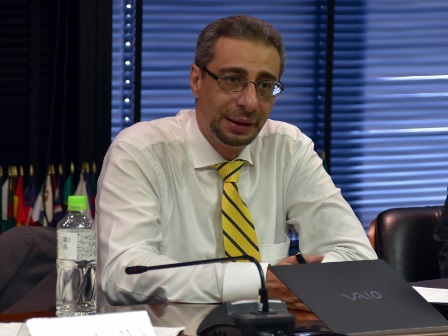
Mr. Elatawy also showcased CCCPA’s program on preventing radicalization and extremism leading to terrorism in Africa. He explained that so far the Center has been working on raising the capacities of local leadership to prevent the recruitment of youth into radical and extremist groups by training those leadership on how to detect and analyze radical narrative, explain how those radical and extremist movements divert from the true interpretation of Islam and train the leadership on skills to construct the counter narrative and communicate their message to the youth at risk. He explained that this is all placed within a preventive perspective (before the youth gets radicalized) and anchored in Islamic sharia which is more familiar and has more relevance to local population than what would be perceived as an “alien narrative”. He also pointed out that women leadership has a prominent place in the Center’s program in recognition of the role played by women in preventing radicalization.
Through workshops related to TICAD, the Center also aimed to support the AU through harmonizing the efforts between the African Union, the TICAD and the experience on the ground through the training centers and the Regional Economic Communities and Regional Mechanisms.
——
Prof. Hasegawa asked the participants to provide indication what Japan and JICA could do. In response, Mr. Elatawy stressed the benefit of trilateral cooperation, Japanese support to training centers as well as providing technological advances that African peacekeepers may need. Mr. Inoue answered that it was perceived to be too dangerous for any Japanese organization to contribute directly. He is of the opinion that Japan should provide more indirect cooperation.
Mr. Hasegawa mentioned that Japan was clean as it was not providing weapons. Why then was Japan not well recognized internationally?
Ambassador Inomata answered that Japanese were still passive, including on POC issues. There was an important difference between POC and humanitarian assistance. Humanitarian assistance never uses force. If the SC authorizes the use of force to rescue people, that is very different from humanitarian assistance. Japan has not advanced humanitarian intervention or R2P concepts. The misinterpretation needs to be corrected. Those who mandated were P5 but they did not use peaceful thinking.
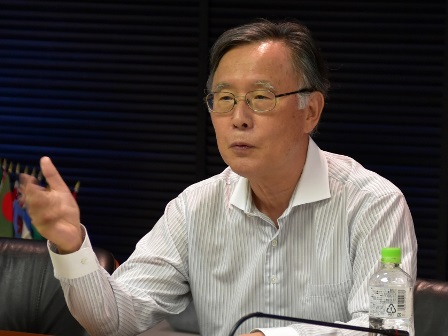
Prof. Hasegawa concluded that peace could not be imposed. A lot of emphasis was made on the national ownership. Outsiders could only support national actors. The nature of the conflict had been changing and this issue needed to be addressed in a more collaborative way. There was a need for a paradigm shift. Japanese government has been doing right things since the World War II. The rationale needed to be established. There was a need to align a right motive to do a right thing.
The rationale needed to be aligned to global governance. Japan’s contribution in South Sudan needed to be conceived in such a way that people find the significance. Timor-Leste was a success because of the commitment of the leaders and people of the people to peacebuilding, but not South Sudan. Japan should have explained that it had decided to withdraw its self-defense forces as South Sudanese leaders were not serious about building peace. Finally, Professor Hasegawa thanked Mr. Hatem Elatawy for having made such a comprehensive presentation and the participants for their participation and contribution of their views and suggestions.
At the end of discussions, GPAJ Secretary-General Kihara-Hunt Ai informed the participants that she was going to draft and forward a summary record of the meeting to them for clearance before uploading it on the home pages of the ACUNS Tokyo Liaison Office and the Global Peaceuilding Association of Japan. Ms. Yumiko Kaneko announced the arrangements had been made for dinner in honor of Mr. Hatem Elatawy. The participants were asked to assemble at the entrance of the UN University at 5:15 p.m.

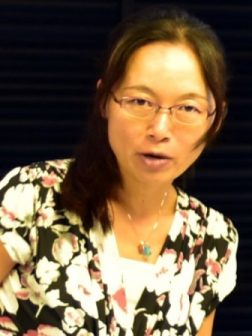
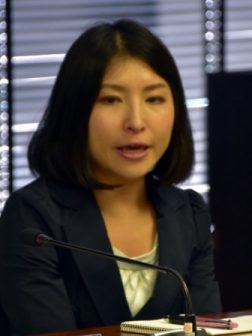




This article has 1 Comment